Frank Molinaro: What I Learned From Cael Sanderson
Frank Molinaro: What I Learned From Cael Sanderson
Frank Molinaro reflects on what he learned from Penn State coach Cael Sanderson.
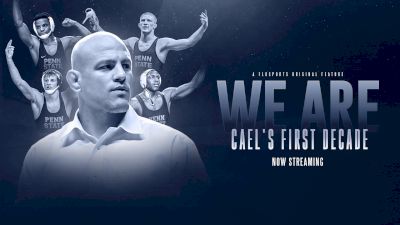
Frank Molinaro wrestled under Cael Sanderson at Penn State during the 2010-12 seasons — placing fifth at the NCAA championships as a sophomore, second as a junior and first as a senior. Molinaro eventually placed fifth at the 2016 Olympics and is currently an assistant at Arizona State.
Sanderson went 159-0 at Iowa State (1999-2002), won a gold medal at the 2004 Olympics and has coached Penn State to 11 NCAA Championships since 2011.
These are Molinaro’s words on what he has learned from Sanderson.
Focus On Improvement — Not Outcomes
From the beginning, the first thing I learned was to stop focusing so much on having success and having the outcomes I wanted — and I started focusing more on improvement. From there, that changed my whole perspective. Then I went from the process being such a grind to the process being so fun — really looking forward to going to practice at 3 p.m. From that, I started going deeper into my perspective and my mentality and my approach because I saw such an advantage for thinking the right way.
The biggest thing I learned from Cael is how to think the right way. How to have the right mentality and the right perspective. He taught me how to be grateful for being able to wrestle and train and always improving. His biggest thing is constant improvement. I think he’s quoted as saying, ‘If you’re not improving, then you’re going to learn a painful lesson from somebody who is.’ That was the biggest thing: constant improvement. That wasn’t just wrestling. Most of that improvement came through mindset. It always came through having the right perspective. Always redirecting us back to the right perspective.
Be Intentional
Penn State does a good job of doing everything intentionally — from their practice plan all the way down to how they’re going to warm up, how they’re not going to warm up, how they’re not going to run, when they’re going to cut their weight, when they’re going to travel, what days they should book the flights, and what airport they should use. They look at every single detail.
They’re very obsessive about the details. They’re very organized and carefully planned. Their approach is very deliberate with everything. Everything has a purpose behind it or has a method behind it.
The Body Follows Your Mind
It used to be that you really didn’t hear anyone talking about mindset. If you started talking about mindset people would probably say you were a weakling and you were scared and you were overthinking. Now all of a sudden, we have mindset coaches. Ohio State launched its Positive Infinity campaign. Everybody has bought into mindset. I wanted to get better at wrestling and they hired Cael Sanderson so I’m thinking, ‘What moves will I learn? What strategies will he teach?’ The real kicker is that it all came from my approach mentally. Once I got my mind right, the body part was easy. The biggest difference was the mindset.
Stay Balanced, Stay humble, No Excuses
Cael is balanced. He balances his emotions extremely well. He doesn’t get too high and he doesn’t get too low. He doesn’t have an ego. He’s able to make the best decisions for himself and for the team. He has humility, too. He’s constantly assessing himself and breaking himself down and breaking the team down and taking all the responsibility when the team doesn’t perform well. That’s what makes him a great coach. He can manage his emotions so he doesn’t get too high or low.
He’s competitive, too. I’ve never met anyone who hates to lose more than Cael. He hates to lose more than he likes to win. I don’t even think he likes winning that much. It’s more part of the game. He’s competitive in everything he does and he’s very level-headed. He doesn’t have an ego and he’s level-headed so he can assess himself. He can make a mistake, fix it, and not have an excuse. Those are the biggest strengths. His competitiveness is second to none. It wears off on the team. It wears on the guys. He lives it. He’s not just preaching it, too.
Be Your Own Reality Television Show
My senior year I was 30-0 (entering the 2012 NCAA Championships) and I believe my last 15 to 20 matches were shutouts. I shut everybody out at the Big Tens. I went pin, tech, tech, and I didn’t give up any points. My first match at the NCAAs I wrestled Chris Villalonga from Cornell and I won by major decision, 9-0. I didn’t give up any points and it was really looking like it was going to be an incredible run to the finish line for me.
During my second-round match against Scott Sakaguchi (Oregon State) — the kid wrestled a really good match — there were six seconds left and I went to kick out of a takedown that I didn’t really have to defend and my knee popped. I walked off the mat devastated because I had a detached retina in that match. When I walked off the mat I couldn’t put any weight on my left foot. I went to the doctors that night. They gave me some medicine and they told me I tore my MCL and I had a tear in my meniscus.
I woke up the next day and it was excruciating pain. They were trying to motivate me by telling me to relax and that it would loosen up after I warmed up. I went out there with one of my teammates, Bryan Pearsall, and I kid you not -- I took one shot and it hurt so bad when I stood up. I was sick to my stomach.
I went straight to the bathroom and I walked into the stall and I fell on my knees and started crying hysterically. I thought it was over. I thought there was no chance I could win. This was the most pain I had ever felt let alone wrestling at the national tournament my senior year. I was supposed to win the nationals this year. Everything was pointed toward winning.
There was nobody else in there. Everyone else was warming up. It was right before the quarterfinal round was going to start. I was in there crying uncontrollably and then I heard somebody walk in and I immediately stopped crying. Someone was knocking on the door and it was Cael. He saw me walk off the mat and he followed me back there. I told him my whole whiny story on why I couldn’t do it anymore and it was the worst thing ever. He listened.
He basically told me, ‘They don’t make movies about the people who quit. They don’t write books about the people who came 99 percent of the way and they hit a huge roadblock. He told me that this was where I could define my career. He said, ‘If you can get through this tournament then you can get through anything in your life.’ This will be a building block for bigger things in your life.
He joked around about being from Jersey and he said, ‘Do you think Jersey Shore would be happy about this if you gave up right now?’ He knew what to say to me. This is what I tell my guys, too. It’s so important to train your mindset, to train your mental routine, and to have that personal relationship with your coach. I tell my kids that I’ll be in there for 700 or 800 workouts a year training you. I know exactly how you think, I know exactly what makes you tick, I know exactly what breaks you, I know exactly what makes you. That was really critical for me when Cael knew what to say.
Molinaro's 2012 NCAA Championships Run
Round 1: major decision over Chris Villalonga (Cornell), 9-0
Round 2: decision over Scott Sakaguchi (Oregon State), 6-5
Quarterfinals: major decision over Eric Grajales (Michigan), 10-2
Semifinals: decision over Justin Accordino (Hofstra), 5-0
Finals: decision over Dylan Ness (Minnesota), 4-1
Related Content
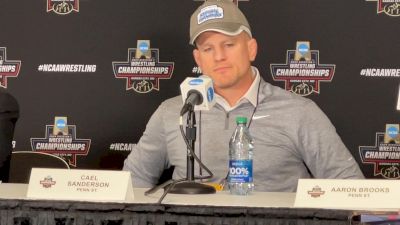 Penn State's Cael Sanderson On Record-Breaking Performance At 2024 NCAA Championships
Penn State's Cael Sanderson On Record-Breaking Performance At 2024 NCAA ChampionshipsMar 24, 2024
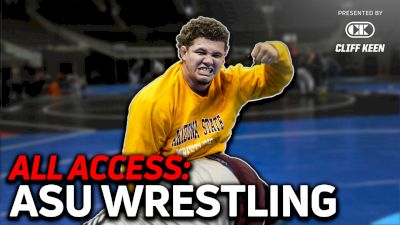 Inside Arizona State's Last Practice Before The 2024 NCAA Tournament
Inside Arizona State's Last Practice Before The 2024 NCAA TournamentMar 21, 2024
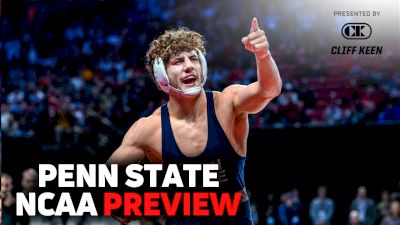 HOW Many Finalists For Penn State??
HOW Many Finalists For Penn State??Mar 16, 2024
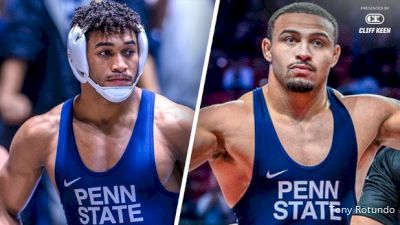 Penn State Wrestling Stars Can Become 4-time NCAA Champions
Penn State Wrestling Stars Can Become 4-time NCAA ChampionsMar 12, 2024
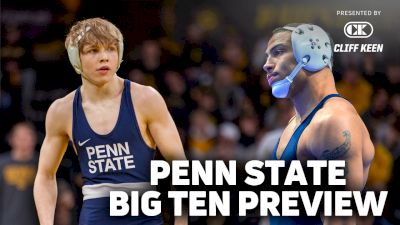 Could Penn State Have A Record Setting Big Ten's
Could Penn State Have A Record Setting Big Ten'sMar 6, 2024
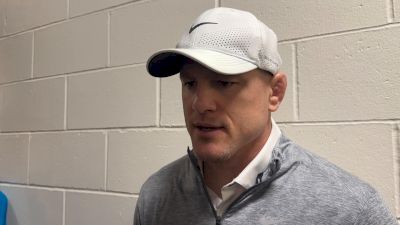 Cael Sanderson On Penn State's 29-6 Win At Iowa
Cael Sanderson On Penn State's 29-6 Win At IowaFeb 10, 2024
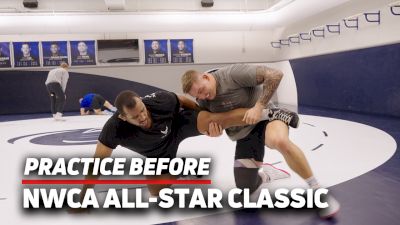 NCAA Wrestlers Putting In Work Before The NWCA All-Star Classic
NCAA Wrestlers Putting In Work Before The NWCA All-Star ClassicNov 21, 2023
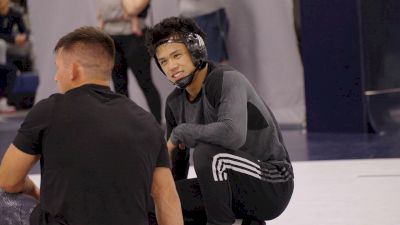 Kyle Parco and Frank Molinaro Practice Before All-Star Classic
Kyle Parco and Frank Molinaro Practice Before All-Star ClassicNov 21, 2023
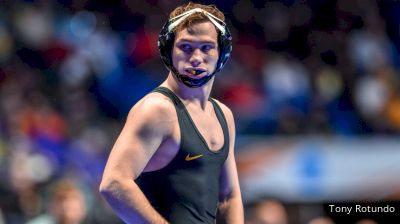 Here's Every Iowa Wrestling NCAA Champion
Here's Every Iowa Wrestling NCAA ChampionSep 8, 2023